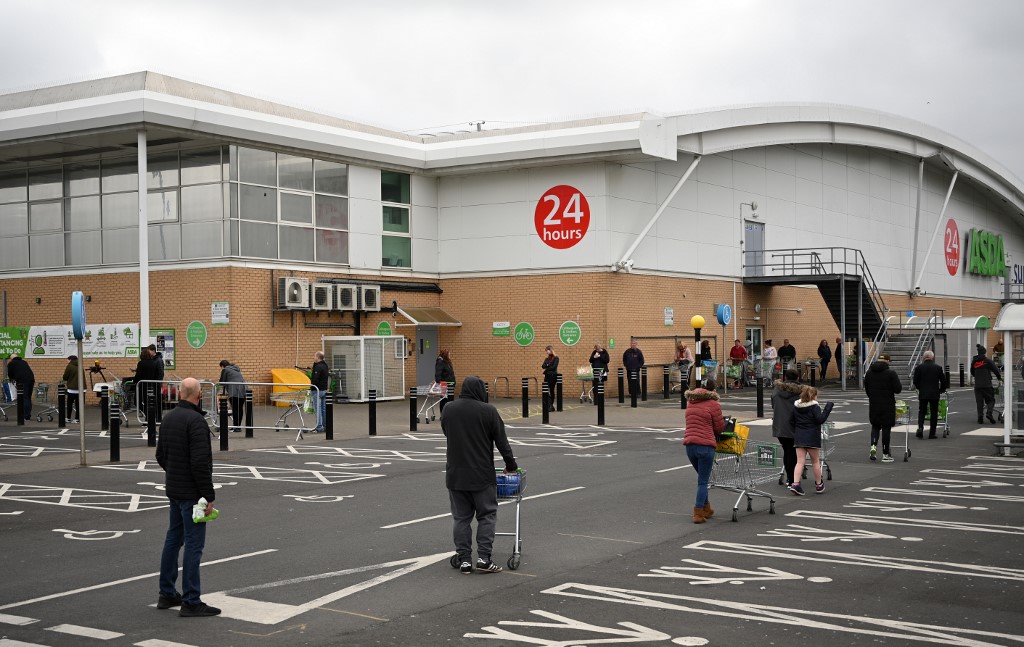Trade of the Day: Stocks and futures gains muted on lockdown fears; oil holds centre stage; credit markets rally on central bank support
Quote of the Day: “As we move through this crisis, more zombies will be flushed out and market stresses will begin to dissipate. In the meantime, a good way to navigate the heightened downgrade risk is to run detailed liquidity and covenant analysis on weaker companies to determine how long they can survive without additional funding while access to liquidity remains limited,” said Martin Dropkin, Fidelity Global Head of Research, Fixed Income.
Stock of the day: China Oilfield Services rose as much as 5.1% after reporting a multifold surge in its net profit for 2019.
Number of the Day: 52 billion pounds. The amount of company dividends that is at risk in the UK this year as the coronavirus crisis prompts businesses to slash payouts.
Tip of the Day: “It is a good time to start buying AUD/JPY. The Chinese economy is restarting and China is likely to press further on the gas pedal, lifting its intake of raw materials exported by Australia. Additionally, Prime Minister Shinzo Abe announced a new JPY 108trillion stimulus package. This stimulus is unlikely to lift Japanese nominal interest rates, but it could raise inflation expectations. This combination will hurt Japanese real rates. Finally, the declining number of new COVID-19 cases in Europe suggests that we are getting closer to the loosening of quarantine measures in the West, which will go a long way to boost growth sentiment globally, a positive process for AUD/JPY,” said BCA Research in a note.
Oil is holding centerstage ahead of a key meeting of oil producing nations but worries that some countries may need to extend lockdowns in their coronavirus battle kept the mood somber.
Brent futures added 4.7% and WTI crude surged 8% ahead of the OPEC plus meeting of oil producing nations later in the day, which is expected to discuss output cuts to boost prices. The collapse in oil prices has battered energy stocks whose market capitalization dominates many benchmarks. Oil producers like Shell have already announced significant cuts in their capital expenditure and share buyback plans. ExxonMobil said capital investments will fall to about $23 billion from a previously announced $33 billion.
Even as oil prices have surged in anticipation of cuts at the OPEC+ meeting, analysts are becoming skeptical even after Russia said it may cut by 1.6 million barrels per day.
“While this is around 15% of their total output and would be a meaningful cut, it would still be a struggle for the whole of OPEC+ to reach 10 million barrels a day, and therefore require the help of other oil producers if they are to get near this target,” said Warren Patterson and Wenyu Yao, commodities strategists at ING Bank in a note.
“Furthermore, if the group does manage to agree on a 10MMbbls/d cut, while it would offer some short-term relief to the market, it would still not be enough to balance it over 2Q20. So it may not take too long for prices to come under pressure once again.”
European benchmark the Stoxx Europe 600 was up 0.5% in volatile trade and off highs over concerns Italy and UK may extend their lockdowns to rein in the pandemic’s spread. S&P 500 futures are down 0.1%.
The coronavirus hangs heavy over investor minds with the infection count of the global pandemic close to the 1.5 million mark.
Korea’s Kospi benchmark rose 1.6%, Hong Kong’s Hang Seng index added 1.38%, Australia’s S&P ASX 200 leapt 3.5% but Japan’s Nikkei 225 ended flat following the outperformance on Wednesday. Regionally, MSCI Asia Pacific ex-Japan benchmark gained1.2%.
Later today, in an online-only discussion, Federal Reserve Chair Jerome Powell, will talk about the current state of the economy, the Fed’s response to the crisis, and what lies ahead. Viewers can also submit questions at the above link.
Earlier in the day, the Hong Kong Monetary Authority (HKMA) announced a plan to suitably reduce the issuance size of Exchange Fund Bills in order to increase the overall Hong Kong dollar liquidity in the interbank market. This follows the overnight HK$137.5 billion package of relief measures announced by the Hong Kong government.
Also on Thursday, the Bank of Korea (BoK) left its main policy rate unchanged at 0.75% on Thursday as expected. But in a post-decision statement it said it will conduct monetary policy in an accommodative manner in order to mitigate downside risks to the economy and ease volatility in financial markets”.
“The BoK did not rule out options taken by the Fed, such as setting up “special purpose corporation” to offer funding for short-term corporate debt, or adopting “yield curve control” policy. This suggests all the options are on the table. Even if there are subtle differences from the measures taken by the Fed, it marks a big step for the BoK to first acknowledge these potential tools, in our view,” said Barclays analyst Angela Hsieh.
The support from central banks to ensure availability of cash to businesses and households is reflected in credit markets outperformance with more investment grade issuance likely to emerge in coming days.
Credit markets had a strong session with sovereign CDS tighter by 3-15bps. The Asia IG Series 33 index moved in by 7 basis points at 128/131.
























